10 start with F start with F

Roy Herron graduated with highest honors from the University of Tennessee at Martin, then studied New Testament and Ethics in Scotland before earning Divinity and Law degrees from Vanderbilt University. But he came home to West Tennessee and served the Volunteer State in both the Tennessee House and Senate. For four decades, Herron served as a legislator, attorney, teacher, and Methodist minister. In that work, he published op-ed essays and articles in Tennessee’s leading newspapers and publications from The Japan Times to The Wall Street Journal on various topics including constitutional liberties, economic justice, health care, politics, and more.
This informative volume collects the most powerful of these writings, adding helpful updates and contemporary insights. With an engaging, conversational style, Herron addresses voter ID laws, drunk-driving statutes, women’s rights and many recurring, contemporary issues. Whether describing the challenges facing his elderly mother as she attempted to exercise her right to vote, or the struggles of working women and men facing illnesses without health insurance, Herron demonstrates an earnestness and thoughtfulness all too rare in politics.
These nearly fifty essays and articles provide evidence that Herron’s Democratic Party and Christianity are not mutually exclusive. Indeed, Herron describes how faith brought him to politics and to fighting for justice, jobs, and constitutional freedoms for all citizens. Faith at Work is a veritable guidebook on how faith and spirituality should affect decision making and advocacy in public life.
ROY HERRON was a Tennessee State Representative from 1987 to 1997 and State Senator from 1997 to 2013. He wrote Things Held Dear: Soul Stories for My Sons and God and Politics: How Can a Christian Be in Politics? He coauthored, with Cotton Ivy, Tennessee Political Humor: Some of These Jokes You Voted For. He lawyers and writes in West Tennessee and Nashville.

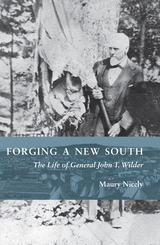
It is the comprehensive picture of Wilder’s nearly nine decades that Maury Nicely seeks to capture in Forging a New South: The Life of General John T. Wilder. “For many war heroes, there was not much beyond the war worth telling,” Nicely writes. “Such was not the case with Wilder.” A successful entrepreneur and industrialist, after the war Wilder relocated to East Tennessee, where he created dozens of businesses, factories, mines, hotels, and towns; was elected mayor of the city he had shelled during the war; and cultivated close personal and business relationships with Federal and Confederate veterans alike, helping to create a new South in the wake of a devastating conflict. Presented in two parts and accompanied by more than sixty detailed photographs and maps, Nicely’s balanced study fills a significant void—the first complete biography of General John T. Wilder.
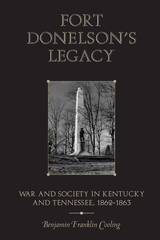
Cooling compellingly describes a struggle that was marked not only by the movement of armies and the strategies of generals but also by the rise of guerrilla bands and civil resistance. It was, in part, a war fought for geography—for rivers and railroads and for strategic cities such as Nashville, Louisville, and Chattanooga. But it was also a war for the hearts and minds of the populace. "Stubborn civilian opposition to Union invaders," Cooling writes, "prompted oppressive military occupation, subversion of civil liberties, and confiscation of personal property in the name of allegiance to the United States—or to the Confederacy, for that matter, since some Unionist southerners resented Confederate intrusion fully as much as their secessionist neighbors opposed Yankee government."
In exploring the complex terrain of "total war" that steadily engulfed Tennessee and Kentucky, Cooling draws on a huge array of sources, including official military records and countless diaries and memoirs. He makes considerable use of the words of participants to capture the attitudes and concerns of those on both sides. The result is a masterful addition to Civil War literature that integrates the military, social, political, and economic aspects of the conflict into a large and endlessly fascinating picture.
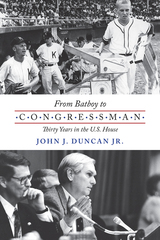
On October 10, 2002, Congressman John J. Duncan Jr. cast a vote in the U.S. House that he thought might end his political career. Going against his own party, he was one of only six House Republicans who voted against the Iraq War resolution. Constituents in his district were shocked, but over time Duncan felt his least popular vote became his most popular one—and probably the most significant in his thirty-year political career.
Congressman Duncan served as U.S. Representative for Tennessee’s Second Congressional district from 1988 to 2019. While he could have written a dense political memoir, in From Batboy to Congressman, Duncan employs a journalistic flair to provide just the right insight into a series of anecdotes from his storied life. Duncan’s family, early life, and time as a lawyer and judge all figure into the generous narrative, shared with both warmth and a self-deprecating sense of humor. He details unique experiences meeting celebrities, presidents, and sports stars; and, of course, he shares insights into the decisions that charted his Congressional career on issues such as Iraq, NAFTA, and concern for fiscal responsibility. Over his decades-long career, Duncan was known for his commitment to constituent service—even among constituents who disagreed with his views—so he offers a refreshing perspective on bipartisanship and connections across the aisle; indeed, he names conservatives, moderates, and liberals alike among his closest friends.
While this book contains timely reflections on issues of war and poverty, of leadership and the lack of it, of the proper relationship between citizens and government, its intention is to highlight moments in a singular career. “As you will read in this book,” writes Congressman Duncan, “every job gave me strange, funny, unusual stories.”
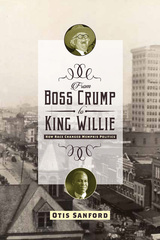
From Boss Crump to King Willie offers an in-depth look at the vital role that race played in the political evolution of Memphis, from the rise of longtime political boss Edward Hull Crump to the election of Dr. Willie Herenton as the city’s first black mayor. Filled with vivid details on the workings of municipal politics, this accessible account by veteran journalist Otis Sanford explores the nearly century-long struggle by African Americans in Memphis to secure recognition from local leaders and gain a viable voice in the city’s affairs.
Sanford explains how, in 1909, Crump won his first election as mayor without black support but then immediately sought to woo and keep the black vote in order to maintain his political machine for the next two generations. The African American community overwhelmingly supported the Crump organization because he at least listened and responded to some of
their concerns, while other white leaders completely ignored them. The book probes Crump’s hot-and-cold relationship with local newspaper editors, some of whom castigated his machine politics, and examines the press’s influence on the political and civic life of the city. It also shows how, amid longstanding racism and poverty in Memphis, the black community nevertheless produced many prominent business, religious, and political leaders, most of whom had an amicable relationship with “Boss” Crump.
The book goes on to explore the political vacuum that ensued after Crump’s death in 1954, and the factors that led to African Americans becoming the majority voting population in the city following Dr. Martin Luther King Jr.’s assassination in 1968. Through the civil rights movement and beyond, black Memphians kept up their fight for recognition and inclusion.
That fight culminated in the election of Dr. Herenton, a well-educated native son who proved to be the right man at the right time to make racial and political history in the city. Additionally, the book compares the racial climate in Memphis with that in other southern cities during the height of the civil rights movement.
OTIS SANFORD holds the Hardin Chair of Excellence in Economic/Managerial Journalism at the University of Memphis. He also serves as the political commentator for WREG-TV in Memphis. A former managing editor and current political columnist at the Memphis Commercial Appeal, he also worked for the Jackson (Miss.) Clarion-Ledger, the Pittsburgh Press, and the Detroit Free Press. He was inducted into the Tennessee Journalism Hall of Fame in 2014.

From Boss Crump to King Willie offers an in-depth look at the vital role that race played in the political evolution of Memphis, from the rise of longtime political boss Edward Hull Crump to the election of Dr. Willie Herenton as the city’s first black mayor. Filled with vivid details on the workings of municipal politics, this accessible account by veteran journalist Otis Sanford explores the nearly century-long struggle by African Americans in Memphis to secure recognition from local leaders and gain a viable voice in the city’s affairs.
Sanford explains how, in 1909, Crump won his first election as mayor without black support but then immediately sought to woo and keep the black vote in order to maintain his political machine for the next two generations. The African American community overwhelmingly supported the Crump organization because he at least listened and responded to some oftheir concerns, while other white leaders completely ignored them. The book probes Crump’s hot-and-cold relationship with local newspaper editors, some of whom castigated his machine politics, and examines the press’s influence on the political and civic life of the city. It also shows how, amid longstanding racism and poverty in Memphis, the black community nevertheless produced many prominent business, religious, and political leaders, most of whom had an amicable relationship with “Boss” Crump.
The book goes on to explore the political vacuum that ensued after Crump’s death in 1954, and the factors that led to African Americans becoming the majority voting population in the city following Dr. Martin Luther King Jr.’s assassination in 1968. Through the civil rights movement and beyond, black Memphians kept up their fight for recognition and inclusion. That fight culminated in the election of Dr. Herenton, a well-educated native son who proved to be the right man at the right time to make racial and political history in the city. Additionally, the book compares the racial climate in Memphis with that in other southern cities during
the height of the civil rights movement.
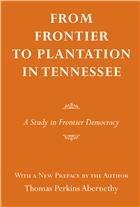
A reprint of Abernethy's excellent historical study of the state of Tennesse from its founding through the antebellum years. In documenting the development of an agrarian society on the frontier, Abernethy develops important and controversial theses on the relation between frontier life and the development of American democracy, calling into question the mythology and motives previously associated with leaders such as William Blount, Andrew Jackson, James K. Polk, and Andrew Johnson.

For Venable, the outdoor world is meant to be enjoyed. Whether he is casting popping bugs to bluegills during the frenzy of a willow fly hatch, lying motionless on his back in muddy corn stubble as mallards warily circle his decoys, savoring the sounds and scents of a moonlit summer night when smallmouth bass are on the prowl, or issuing plaintive love calls to an amorous wild turkey gobbler, the author's fascination with outdoor recreation never diminishes. And, as the reader quickly finds, this fascination is contagious.
Along with the lightheartedness and rich humor in these pages, there is an unmistakable love of the land and a deep concern for the endangered bond between nature and humankind. Like the trout in the stream or the deer in the forest, Venable suggests, we are as much a product of the land as any living creature. And what affects one - for better or worse - ultimately affects all.
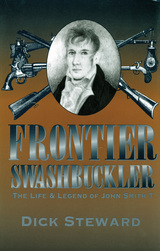
Few frontiersmen in the late eighteenth century and early nineteenth century epitomized the reckless energies of the West and the lust for adventure as did John Smith T—pioneer, gunfighter, entrepreneur, militia colonel, miner, judge, and folk hero. In this fascinating biography, Dick Steward traces the colorful Smith T's life from his early days in Virginia through his young adulthood. He then describes Smith T's remarkable career in the wilds of Missouri and his armed raids to gain land from Indians, Spaniards, and others.
Born into the fifth generation of Virginia gentry, young Smith first made his name on the Tennessee frontier. It was there that he added the "T" to his name to distinguish his land titles and other enterprises from those of the hosts of other John Smiths. By the late 1790s he owned or laid claim to more than a quarter million acres in Tennessee and northern Alabama.
In 1797, Smith T moved to Missouri, then a Spanish territory, and sought to gain control of its lead-mining district by displacing the most powerful American in the region, Moses Austin. He acquired such public positions as judge of the court of common pleas, commissioner of weights and levies, and lieutenant colonel of the militia, which enabled him to mount a spirited assault on Austin's virtual monopoly of the lead mines. Although neither side emerged a winner from that ten-year-old conflict, it was during this period that Smith T's fame as a gunfighter and duelist spread across the West. Known as the most dangerous man in Missouri, he was said to have killed fourteen men in duels.
Smith T was also recognized by many for his good works. He donated land for churches and schools and was generous to the poor and downtrodden. He epitomized the opening of the West, helping to build towns, roads, and canals and organizing trading expeditions.
Even though Smith T was one of the most notorious characters in Missouri history, by the late nineteenth century he had all but disappeared from the annals of western history. Frontier Swashbuckler seeks to rescue both the man and the legend from historical obscurity. At the same time, it provides valuable insights into the economic, political, and social dynamics of early Missouri frontier history.
READERS
Browse our collection.
PUBLISHERS
See BiblioVault's publisher services.
STUDENT SERVICES
Files for college accessibility offices.
UChicago Accessibility Resources
home | accessibility | search | about | contact us
BiblioVault ® 2001 - 2024
The University of Chicago Press









